| PICTURE FRAMES: METAL OR WOOD? |
 |
|
At KeenART Media, we carry more than 400 styles of solid wood frames. Our quality metal frames are available in four different styles in six finishes.
The following article outlines the differences between wood and metal frames in eight distinct areas. While these two picture frame options are quite disparate, each is suitable for different styles of home decor and artwork display.
|
SUMMARY
Comparing the differences between wood and metal frames in eight areas:
| STYLE AND COLOR |
FACE WIDTH |
FRAME WEIGHT |
FRAME PRICE |
| Wood: hundreds of styles, colors, and finishes. Metal: six finishes and four different styles, suitable for all displays. |
Wood: face widths range from less than an inch to 5-1/2 inches. Metal: two available face widths: 3/8" and 7/8". |
Wood: generally weigh more than metal frames, with wider faces weighing at least double. Metal: lightweight due to hollow construction. |
Wood: these frames are more expensive due to natural materials Metal: anywhere from 7% to 25%+ cheaper than wood frames. |
| BUILDING PROCESS |
ASSEMBLY AND FITTING |
DURABILITY/LONGEVITY |
PERSONALIZATION |
| Wood: can be cut with saw or straight blade, and assembled with nails. Metal: must be cut with a saw, and can be assembled without machinery. |
Wood: frame will arrive fully assembled; contents laid in back of frame. Metal: one arm of the frame must be removed to insert the frame contents. |
Wood: long lasting if properly stored and cared for. Metal: man-made material has no acid components and will not degrade itself or artwork over the years. |
Wood: raw frames can be painted or varnished to create a personalized frame. Metal: painting is more difficult, but simple design makes all frames suitable for an artwork. |
|
| STYLE AND COLOR OPTIONS
|
 |
WOOD
Our wood mouldings come in a wide variety of colors, shapes, styles, and finishes.
The face may be flat, with a bevelled lip, or outer edge. It may be curved, have a raw, textured finish, or feature a rope or floral design. More intricate wood frame faces feature multiple levels of various ornamentation, ranging from simple ridges and valleys to grooves, beading, scroll and leaf, or fleur-de-lis designs.
Wood frames are generally painted, so they come in every color imaginable. Natural wood tones include walnut, mahogany, and pine. Bright, bold primary colors of purple, blue, red, and green are also available, as are basic, classic black and white. The paint may be buffed away for an antique look to match the decoration.
Additionally, wood frames may be glossy, matte, or rustic in finish. Some styles will include both matte and glossy options. Though a flat or semi-matte finish is most common, almost any finish is available in some style.
METAL
At KeenART Media, we offer four different styles of contemporary metal frames, all of which are available in three different colors and two finishes.
The styles include a curved face with a smooth or ridged drop edge, a nearly flat face with a smooth drop edge, and a wide curved face. Each style is available in shiny or matte black, silver, or gold. The matte colors have been brushed for a soft, textured look.
|

Wood picture frame mouldings
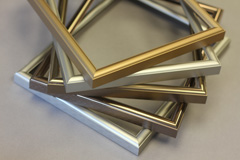
Metal picture frame mouldings
|
| FRAME FACE WIDTHS
|
 |
WOOD
Wood frames come in almost every width between 3/4" and 4". We even have one frame with a 5-1/2" face. Since you will need to match your frame face width with the mat, the artwork size, and the overall frame size, we make sure you have plenty of options to get the best result.
Frame style will also affect the apparent frame width. For instance, a 3" frame with a completely flat face will look more dominating than the same frame with a bevelled lip.
METAL
Metal frames are generally available only in narrower frame widths. This is a useful quality, as it ensures a metal frame will never interfere with the artwork - the painting or photograph is always the focus in a metal frame.
We offer metal frame face widths of 3/8" and 7/8". Both of these widths is suitable with almost any mat width or artwork size, from a tiny 4x6" to a large 24x36".
|

Wood picture frame face widths
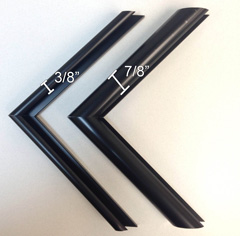
Metal picture frame face widths
|
| FRAME WEIGHT
|
 |
WOOD
Wood frames tend to be heavier than metal frames, but those of the same face width are relatively similar.
24x36" Wood Frame Weights:
- One Inch Face: 2.5 lbs
- Two Inch Face: 4 lbs
- Three Inch Face: 8 lbs
The wider and heavier a wood frame, the better it will be joined during the construction process. This means any wood frame should be quite capable of supporting its own weight, as well as that of whatever contents are placed inside.
METAL
Metal frames weigh less than nearly all wood frame styles due to the lightness of the material, and their hollow construction. In general, metal frames weigh 0.2 pounds per foot, and a 24x36" metal frame weighs 2 pounds.
Regardless of how large the frame, the method of construction remains the same, usually metal corner plates that hold the arms of the frame together. For this reason, the user must be conscious of the weight of the frame contents.
As long as the contents of the frame are not too heavy, a metal frame is a good, lightweight option for large pieces such as posters. If the piece is quite large, acrylic glass (Plexiglass) is recommended instead of regular glass - it generally weighs about half as much as its traditional alternative.
|
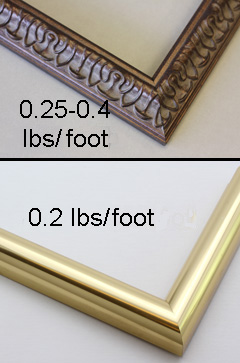
Weight of wood and metal frames
|
| FRAME PRICE
|
 |
WOOD
In general, wood frames are more costly than metal frames. This is due to the amount of work required to create the mouldings, and construct the frames. In addition, wood frames tend to be more ornate, which raises their worth.
Base Prices for a Wood Frame:
- 8x10": $29
- 18x24": $66
- 24x36": $105
METAL
Metal frames are usually less expensive than wood frames. This is due to the fact that they are created using dies, a method which requires less individual treatment and handiwork. That they are made from a man-made rather than natural material also affects their worth. In addition, most metal frames have a narrower face than wood frames, and less bulk.
Base Prices for a Metal Frame:
- 8x10": $27 (7% less)
- 18x24": $53 (20% less)
- 24x36": $80 (24% less)
As you can see, while smaller metal frames cost about the same as small wood frames, as the frame gets larger, metal frames become an increasingly cheaper option.
|
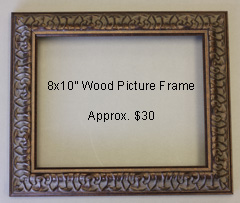
8x10" wood frames start at $30
|
| FRAME-BUILDING PROCESS
|
 |
WOOD
The process to go from moulding lengths to finished picture frame is more involved for wood than metal.
The long (12-14 foot) wood moulding lengths are very heavy and difficult to maneuver. They are cut to the appropriate size (for instance, for an 8x10" frame, two-8 inch and 2-10 inch pieces must be cut) using a miter saw or blade, which cuts the wood on a 45 degree angle. The pieces are then placed end to end (to form a corner) on the underpinning machine. A bit of wood glue is applied to the ends, and then wedge nails are forced up into the bottom of the frame, holding the two arms together. This is repeated for all four corners.
METAL
Building a metal frame requires less machinery than wood frames, but more hardware.
The long metal mouldings are much lighter than wood, and therefore easier to maneuver. They must be cut using a miter saw, as a straight-edge blade will not cut through the metal. Flying shards of metal can be quite dangerous, so the framer must wear a mask when cutting, and ensure a guard is in place over the saw blade.
Once the arms of the frame have been cut, no further machinery is required. The frame may be shipped to the customer assembled, or in these pre-cut lengths with the necessary hardware included. Assembling the frame involves placing flat metal corner pieces in each corner and tightening screws which put the pieces apart, holding the frame together. A screwdriver is the only tool needed for this process.
|
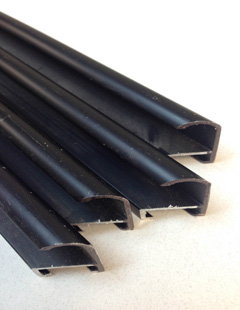
Pre-cut metal picture frame arms
|
| ASSEMBLY/FITTING ARTWORK
|
 |
WOOD
When a wood frame is ordered, it will arrive to the customer fully assembled. This is the only option, as special equipment not owned by most people is required for assembling a wooden frame. Plexiglass and backing may also included in the frame. These pieces, along with any mats and the artwork, are simply set into the back of the frame, behind the lip (called the rabbet).
Once the contents are in place, small nails can be hammered into the back of the frame, or flat metal points can in inserted to hold the art in place. Alternately, tape can be applied, covering the back of the frame, and the back of the contents.
All wood frames come with hanging hardware that can be attached with supplied screws, using a drill or screwdriver.
For more detailed instructions on how to fit and hang art in a wooden frame, read our Mounting Art and Frame Fitting articles.
METAL
A metal frame may be shipped to the customer assembled or unassembled, depending on the size, customer preference, and additional contents being shipped with it.
Because only a screwdriver is needed to assemble a metal frame once the arms have been cut to size, most customers can do this from home. Even if the frame is assembled when sent, it will need to be partially taken apart in order to fit the artwork.
A screwdriver is used to loosen the corner plates in two of the corners, so one arm of the frame can be removed. Any acrylic glass, backing, or mats can now be slid out. The artwork is placed within the contents as required, and the entire package is slid back into the frame. The top arm is replaced, hanging hardware is attached, and the frame is ready to display.
For more detailed instructions on assembling metal frames and fitting and mounting art, read the article: How to Assemble a Metal Frame.
|
>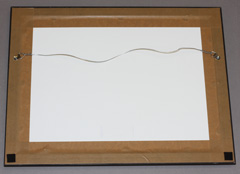
Finished back of a wood frame
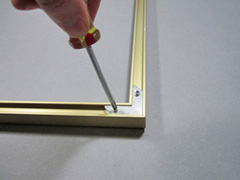
A screwdriver is used to tighten the corner plates
|
| DURABILITY AND LONGEVITY
|
 |
WOOD
Durability
When well constructed - and with a wide enough frame face to support the contents - wood frames are very durable. Their construction ensures heavy contents will be safely contained within the frame, without any arm breaking away because of the weight.
Dropping or bumping a wood frame may result in nicks, dents, or chips in the paint or the wood itself. Though this can happen relatively easily, damage to wood frames is easier to repair than metal frames. Wood filler, sandpaper, and matching paint or varnish can disguise or completely renew most damage.
Longevity
Wood frames are constructed from solid wood, and if properly cared for (primarily, kept out of high humidity situations), can last centuries. Any paints, coatings, or even raw, natural wood, may fade over time if the frame is exposed to direct light.
The wedge nails used to hold the frame together will last as long as the frame itself, and barring extreme warping due to humidity, the wood glue will seal indefinitely as well.
Though the frame will last a long time, if not properly prepared before fitting, natural lignin in the wood can damage artwork over time. For more information, see our article about Conservation Framing.
METAL
Durability
Metal frames are very durable when properly assembled - the corner plates must be tightly screwed in to avoid shifting and loosening should the frame the jostled. It is advisable to check the tightness of the joints after fitting the contents of the frame, to ensure they were not loosened while fitting.
Metal frames are often more resistant to damage caused by bumps and dropping, though corners may be dinged. However, if the frame is scratched - most often caused by cleaning with an abrasive cloth or scraping along other metal - this damage is more difficult to fix and conceal than damage to a wood frame.
There are ways to minimize the visibilility of aluminium scratches, and possible conceal minor ones, but this process is more involved than repairing small nicks in wood frames.
Longevity
Most metal frames are made from anodized aluminium, which will last a very long time, and is less susceptible to the environmental conditions that can weaken wood frames. There is no chemical content in metal frames, so they will not damage artwork or break down over time.
Assuming your metal frame is properly cleaned and gently handled, it should last for centuries.
|

Good quality picture frames can last for centuries
|
| PERSONALIZATION
|
 |
WOOD
One great thing about wood frames is the ease with which they can be painted or otherwise decorated to suit each customer's need. Raw, natural wood frames such as our rustic Country line can be varnished or completely repainted with any product intended for wood.
The wide array of options is in itself a point for personalization in wood frames. Whatever your decor style or personal preference, it's very likely one of our more than 400 frames will suit your needs.
Whether you require classic/contemporary, like our Matte Black reverse scoop, elaborate and gilded, like our Ornate Gold Leaf, or somewhere in between, there is a wood frame for everyone from the DIY-er to the short-on-time decorator.
Finally, we can personalize your frame for you! Our unique Resin Picture Frame service offers your choice of frame decorated with one of a wide selection of decorative objects, and coated in a high shine, protective resin finish. Contact us today for more information.
METAL
Though for metal frames there are considerably offer fewer options, this simplified selection process can cut back on deliberation time. And the basic, narrow face of metal frames makes each one perfectly suited for any artwork at all. The customer need only select a color: Black, Silver, or Gold, and a finish: Frosted (matte) or Shiny, and most of the work is already done. With metal frames, the display is personalized by the subtly of the frame and the choice of artwork.
Though the customer may choose to paint or decorate a metal frame, this option is not as durable as it is in the case of wood. Special paint should be used, and a clear sealant may be required to avoid chips and peeling.
|

Raw wood picture frames with a matte finish
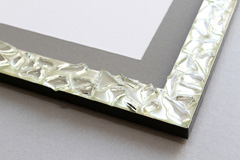
A custom-made "Broken Glass" resin frame
|
|
Wood and metal frames have extremely different components and stylistic choices, but each is suitable for its own purposes.
If you have questions about any of our wood or metal frames, or any other services or products, don't hesitate to contact us. Our knowledgeable staff is always happy to assist with answers, advice, or suggestions.
|
| Picture Framing FAQs: |
 |
Q1 : Can I order a picture frame without ordering any prints?
Yes, just pick the molding you want, select the width and height, and add it to the shopping cart.
Q2 : Can I order length moulding instead of joined frames?
Yes, just click on a profile and in main order form find the Length Moulding link.
Q3 : How big will the final product be after my photo has been put inside the frame?
Something that people might not consider is that once you’ve added a frame around your artwork the entire piece can become larger than you wanted it.
Our picture frame calculator will calculate the size of the entire piece with the frame, mat and/or liner. First, measure your artwork and choose a frame. Enter in the dimensions of the artwork into the boxes. If you add a liner, you don’t need to worry about recalculating the sizes - it is all done for you.
After you have finished creating your custom picture frame, you will see a measurement next to the “artwork width” drop down list. This is the measurement of the entire piece when put inside the frame (from the outside edges of the frame).
Q4 : What are the standard sizes for picture frames?
4" x 6"
5" x 7"
8" x 10"
8.5" x 11"
9" x 12"
10" x 13"
11" x 14"
12" x 16"
14" x 18"
16" x 20"
18" x 24"
20" x 24"
22" x 28"
24" x 30"
24" x 36"
32" x 40"
Q5 : How do I clean my frame?
Most of our frames are made from wood, so they can be damaged over time if cleaned with regular household cleaners. The best way to clean the frame is to regularly dust it, preventing debris build up. Alternately, you may clean it with a microfiber cloth or warm water.
The glass can be cleaned with glass cleaner or water.
Q6 : What is a Rabbet?
Rabbet (pronounced “rabbit”) is a technical term for the space behind the lip of the frame. This space needs to be big enough to fit everything that is being framed, the work, the backing, matting and plexi glass. When framing three-dimensional objects, like fabric or souvenirs, the size of the rabbet is an important consideration. Selecting a frame with an appropriate rabbet is an important part of the work of a professional framer.
Q7 : Do your metal frames come with the pressure clips to keep the work up tight against the glass/plexiglass?
Yes. We include all hardware needed, including the pressure clips.
Order online: Spring/pressure clips, in bulk.
Q8 : How thick the standard plexiglass is ?
The plexiglass sheets we use are 0.118" thick.
Q9 : What are Canvas Offsets or Z Brackets?
Metal Offset Canvas Clips or Canvas Offsets are used to hold artwork into frames or for construction projects. They are shaped bits of metal with screw hole in one end and sometimes in the other. They are used when fitting stretched canvas into a frame with a shallow rebate, and are also useful for shadow box framing.
Order online: Offset Clips
Q10 : Can I order Custom Cut Frame MatBoards?
Yes, to order click here: Custom Cut Frame MatBoards
Q11 : What happens if the art I send you gets damaged?
We are unfortunately unable to offer compensation for damage to or loss of customer-submitted materials. We strongly recommend you insure any valuable artwork for its full worth prior to shipping it to us.
Q12 : How to order a frame corner sample?
Simply click on a given molding or profile and you will find a link to order corner samples: See the link "Need ... Sample?" at the end of the profile details.
Q13 : Are frames shipped already put together or do you offer assembly required frames.
We ship joined ready to use frames if it is a wood frame. For metal frames based on the size we may ship un-assembled but we will provide all the hardware required and for metal frames assembly is an easy process.
Q14 : Do you make Stacked Frames?
Yes, we offer two, three or even four layers of Stacked Frames online. To order start from the inner frame by selecting the artwork size. You can order more outer frames by estimating the size.
The outer size of a inner frame will be the new artwork size when ordering a new outer frame. When ordering stacked frames in order note box remind us that theee are for a stacked frame and when cutting we make sure frames fit inside each other perfectly.
The best result will be when the height of the inner frame is equal or less than the rabbet of the otter frame.
Q15 : How should I measure my artwork when ordering frames online?
Please read this page: HOW TO MEASURE YOUR ARTWORK
Q16 : How Can I order a custom-size Cork Board or Bulletin Board frame?
Please visit our custom-made picture framing page, click on a wooden or metal profile, select the board dimension and as backing select Cork Foamboard. You will see the pricing for the size you selected.
Q17 : what is a mini floater frame?
A mini floater frame is a small, narrow frame that's designed to enhance and display smaller artworks, photographs, or prints. Unlike traditional frames that cover a portion of the artwork's edges, a floater frame is constructed in a way that the artwork appears to "float" within the frame, leaving a small gap between the edges of the artwork and the frame itself. This design gives the artwork a modern and minimalist look, and it can create the illusion that the artwork is suspended within the frame.
Mini floater frames are often used to showcase smaller pieces of art and add a unique visual element to the presentation. They are available in various styles, materials, and finishes, making them a popular choice for artists, photographers, and art enthusiasts looking for a contemporary way to display their creations.
Q18 : What is a snap picture frame?
Snap Frames, also known as click frames or snap-open frames, are aluminum frames for posters equipped with spring-loaded sides. These springs allow the snap frame's sides to be easily opened and closed.
Q19 : Are acrylic sheets get yellow after a couple of years
Acrylic sheets can yellow over time due to exposure to UV light, especially if they are not UV-resistant. However, the rate at which they yellow can vary based on the quality of the acrylic and the conditions in which it's kept. Higher-quality acrylic sheets that are UV-resistant are less likely to yellow quickly. Regular cleaning and proper maintenance can also help slow down the yellowing process.
Q20 : Why non-glaie acrylic sheets are NOT preferred for shadow boxes?
Non-glare Plexiglas or acrylic sheets are not ideal for shadow boxes due to their matte finish, which diffuses light and reduces reflections. Here are a few reasons why they are not suitable:
Visibility: The non-glare surface scatters light, which can cause the contents of the shadow box to appear blurry or less clear. Shadow boxes often contain detailed or three-dimensional items that need to be seen clearly.
Depth Perception: Shadow boxes are designed to create a sense of depth by displaying items in a three-dimensional space. Non-glare Plexiglas can diminish this effect by diffusing light in a way that flattens the visual perception of depth.
Aesthetic Quality: The diffused light can alter the appearance of colors and textures within the shadow box, making them appear duller than they would with clear glazing.
For these reasons, clear acrylic sheets are generally preferred for shadow boxes, as they provide a clear view of the contents and maintain the intended visual depth and detail.
Q21 : What is a Liner?
Liners (also called linen liners) are fabric-covered mouldings, used inside the outer moulding in a frame design. A liner is not completely finished, so it would not be used as the only moulding for a frame. Liners often are used in place of mats on framed canvas prints or oil paintings that do not require glass.
Liners serve much the same visual purpose as a mat, separating the work from its frame.
Order online: Linen Liners
Q22 : Do you offer hanging services?
Unfortunately, we do not offer hanging services.
Q23 : What filler do you recommend for picture frames?
We use Amaco Nail Hole and Corner Filler, which is a perfect filler for picture frames, as well as for sealing cracks and crevices in wood furniture. This brand exists in more than 16 different colors.
|
|
| If you don't find the answer you're looking for here, please contact us. |
|
© 2002-2025 - KeenART Media Ltd.
|
|
| |
|

